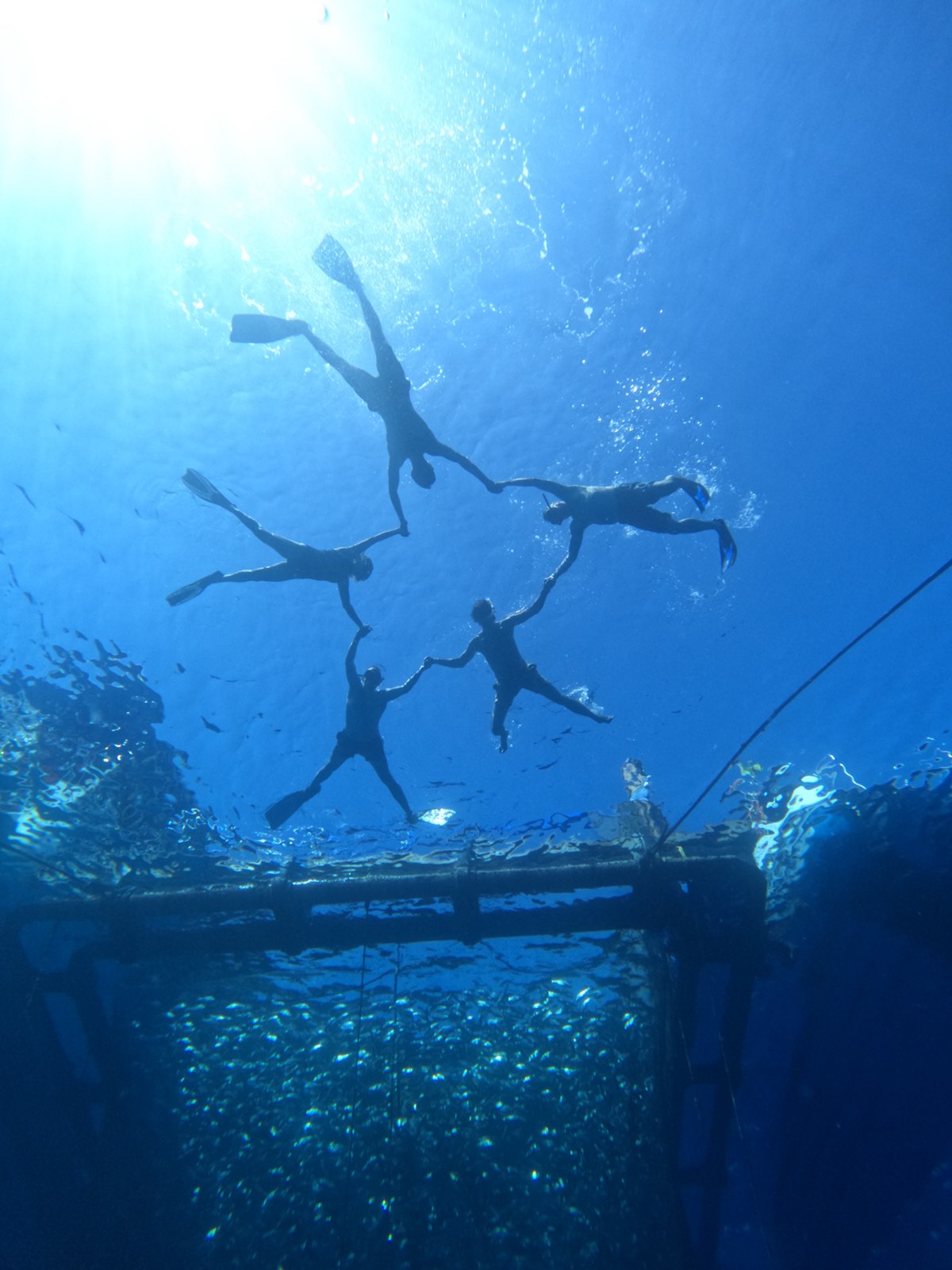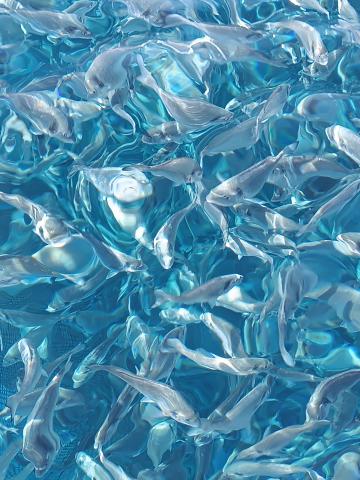BlueAquaEdu 2ᵉ École d'Été en Grèce

Welcome to the
Summer School of
Aquaculture!
Gain a foundational understanding of post-harvest management in aquaculture, including key stages from harvest to market, challenges and opportunities.
La participation sur place est obligatoire. Un nombre limité de bourse de mobilité est disponible.
Date limite de candidature: 15 septembre
Vous serez informé du résultat dans les 5 jours suivant la date limite de candidature.
Postule et découvre l’expérience BlueAquaEdu!
Dates
du 13 au 19 octobre 2025
Emplacement
Rhodes, Grèce
Organizers
BlueAquaEdu European Program

Summer School Objectives
By completing this summer school, students will:
- Understand the importance and global trends in aquaculture.
- Differentiate between various types of aquaculture systems (extensive, semi-intensive, intensive, IMTA).
- Identify key fish species in aquaculture, including their biological and physiological characteristics.
Summer School Curicullum
DAY 1
12 May

| 10:00-10:30 | Registration and Welcoming coffee | |
| 10:30-11:00 | Introduction to the BlueAquaEdu project | George Triantaphyllidis (AUA) |
| 11:00-11:30 | The BlueAquaEdu serious game | Nikolaos Triantaphyllou (MINDS) |
| 11:30-12:00 | Introduction to Cage Farming: Overview and Importance | Emmanouil Malandrakis (AUA) |
| 12:00-12:30 | Coffee break | |
| 12:30-13:00 | Key species in the Mediterranean Aquaculture | George Triantaphyllidis (AUA) |
| 13:00-14:00 | Site Selection and Preparation: Factors to Consider | George Triantaphyllidis (AUA) |
| 14:00-14:30 | Lunch Break |
| 14:30-15:30 | Feeding Practices: Strategies for Nutrient Optimization | Emmanouil Malandrakis (AUA) |
| 15:30-17:00 | Health Management: Disease Prevention and Treatment | Konstantina Bitchava (AUA) |
| 17:00-17:30 | Harvesting Techniques: Efficient and Safe Harvesting Methods | Anastasios Baltadakis/Savvas Chatzinikolaou (LAMAR) |
| 17:30-18:00 | Planning and Establishment Phase: Site Assessment and Infrastructure Development | Anastasios Baltadakis/Savvas Chatzinikolaou (LAMAR) |
| 18:00-18:30 | Environmental considerations by cage farming/Sustainable practices | George Triantaphyllidis (AUA) |
DAY 2
13 May

| 9:00-9:15 | Welcoming coffee | |
| 9:15-9:45 | Introduction to aquaculture hatcheries. Broodstock Selection: Criteria and Considerations | Emmanouil Malandrakis (AUA) |
| 9:45-10:30 | Spawning Techniques: Induced Spawning and Natural Spawning Egg Incubation: Environmental Conditions and Monitoring | George Triantaphyllidis (AUA) |
| 10:30-11:00 | Larval Rearing: Feeding Strategies and Water Quality Management | George Triantaphyllidis (AUA) |
| 11:0-11:30 | RAS Engineering | Joao Rito/Ana Costa (SEAentia) |
| 11:30-11:45 | Coffee Break | |
| 11:45-12:15 | Water Quality and Treatment in RAS | Joao Rito/Ana Costa (SEAentia) |
| 12:15-12:45 | Fish welfare | Joao Rito/Ana Costa (SEAentia) |
| 12:45-13:15 | Introduction to aquaculture post-harvest management | Evanthia Chatzoglou/George Triantaphyllidis (AUA) |
| 13:15-13:45 | Handling and Processing of Aquatic Products | Evanthia Chatzoglou/Emmanouil Malandrakis (AUA) |
| 13:45-14:15 | Lunch Break |
| 14:15-14:45 | Emerging technologies in aquaculture Post-Harvest | Achilleas Lekkas (InnovaSea) |
| 14:45-15:15 | Industry trends and challenges | Claire Fox (French lecturer) |
| 15:15-15:45 | Extraction methods and technologies | Claire Fox (French lecturer) |
| 15:45-16:00 | Maintenance and quality control | Claire Fox (French lecturer) |
| 16:00-16:15 | Raw material sourcing and handling | Claire Fox (French lecturer) |
| 16:15-16:30 | Processing and packaging techniques | Claire Fox (French lecturer) |
DAY 3
14 May

| 9:00-18:00 | Practical aspects of mooring and cage installation, net cleaning, inspection of cages-nets-mooring system, net change and harvesting Visiting LAMAR Fin-Fish cage installations | LAMAR |
DAY 4
16 October

| 9h-15h | Hands-on experience from the LAMAR fish packaging unit in Rhodes, Greece, in quality control, storage methods, labelling and more for a comprehensive understanding of industry best practices. | LAMAR |
| 15h-18h | The serious game | MINDS |
Summer School Courses
DAY 1
Title Course
Durée
Delivered by
Introduction to the BlueAquaEdu project
30 min
George Triantaphyllidis (AUA)
The BlueAquaEdu serious game
30 min
Nikolaos Triantaphyllou (MINDS)
Introduction to Cage Farming: Overview and Importance
30 min
Emmanouil Malandrakis (AUA)
Key species in the Mediterranean Aquaculture
30 min
George Triantaphyllidis (AUA)
Site Selection and Preparation: Factors to Consider
1 h
George Triantaphyllidis (AUA)
Feeding Practices: Strategies for Nutrient Optimization
1 h
Emmanouil Malandrakis (AUA)
Health Management: Disease Prevention and Treatment
1h 30min
Konstantina Bitchava (AUA)
Harvesting Techniques: Efficient and Safe Harvesting Methods
30 min
Anastasios Baltadakis/Savvas Chatzinikolaou (LAMAR)
Planning and Establishment Phase: Site Assessment and Infrastructure Development
30 min
Anastasios Baltadakis/Savvas Chatzinikolaou (LAMAR)
Environmental considerations by cage farming/Sustainable practices
30 min
George Triantaphyllidis (AUA)
DAY 2
Title Course
Durée
Delivered by
Introduction to aquaculture hatcheries. Broodstock Selection: Criteria and Considerations
30 min
Emmanouil Malandrakis (AUA)
Spawning Techniques: Induced Spawning and Natural Spawning Egg Incubation: Environmental Conditions and Monitoring
45 min
George Triantaphyllidis (AUA)
Larval Rearing: Feeding Strategies and Water Quality Management
30 min
George Triantaphyllidis (AUA)
RAS Engineering
30 min
Joao Rito/Ana Costa (SEAentia)
Water Quality and Treatment in RAS
30 min
Joao Rito/Ana Costa (SEAentia)
Fish welfare
30 min
Joao Rito/Ana Costa (SEAentia)
Introduction to aquaculture post-harvest management
30 min
Evanthia Chatzoglou/George Triantaphyllidis (AUA)
Handling and Processing of Aquatic Products
30 min
Evanthia Chatzoglou/Emmanouil Malandrakis (AUA)
Emerging technologies in aquaculture Post-Harvest
30 min
Achilleas Lekkas (InnovaSea)
Industry trends and challenges
30 min
Claire Fox (French lecturer)
Extraction methods and technologies
30 min
Claire Fox (French lecturer)
Maintenance and quality control
15 min
Claire Fox (French lecturer)
Raw material sourcing and handling
15 min
Claire Fox (French lecturer)
Processing and packaging techniques
15 min
Claire Fox (French lecturer)
DAY 3
Title Course
Durée
Delivered by
Practical aspects of mooring and cage installation, net cleaning, inspection of cages-nets-mooring system, net change and harvesting Visiting LAMAR Fin-Fish cage installations
9 h
LAMAR
DAY 4
Title Course
Durée
Delivered by
Hands-on experience from the LAMAR fish packaging unit in Rhodes, Greece, in quality control, storage methods, labelling and more for a comprehensive understanding of industry best practices.
6 h
LAMAR
The serious game
3 h
MINDS